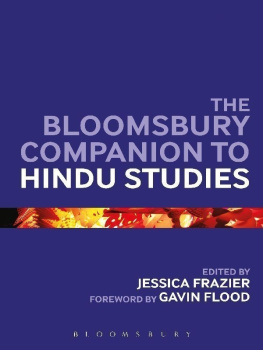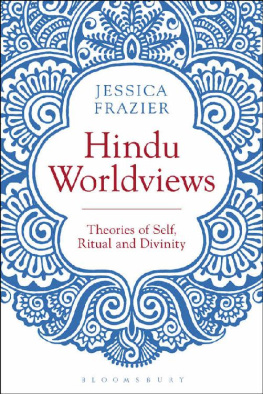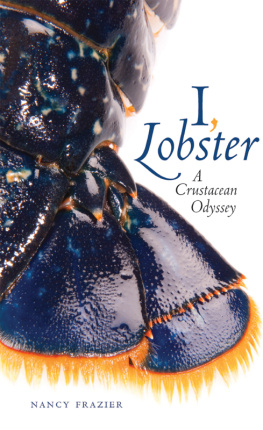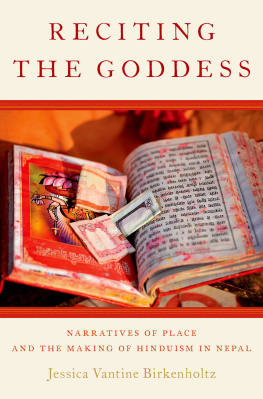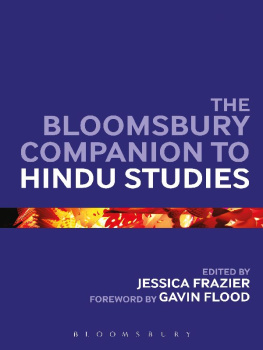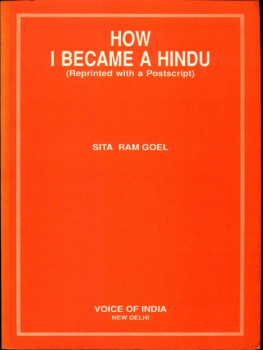Jessica Frazier - Hindu Worldviews
Here you can read online Jessica Frazier - Hindu Worldviews full text of the book (entire story) in english for free. Download pdf and epub, get meaning, cover and reviews about this ebook. publisher: Bloomsbury UK, genre: Religion. Description of the work, (preface) as well as reviews are available. Best literature library LitArk.com created for fans of good reading and offers a wide selection of genres:
Romance novel
Science fiction
Adventure
Detective
Science
History
Home and family
Prose
Art
Politics
Computer
Non-fiction
Religion
Business
Children
Humor
Choose a favorite category and find really read worthwhile books. Enjoy immersion in the world of imagination, feel the emotions of the characters or learn something new for yourself, make an fascinating discovery.

- Book:Hindu Worldviews
- Author:
- Publisher:Bloomsbury UK
- Genre:
- Rating:4 / 5
- Favourites:Add to favourites
- Your mark:
- 80
- 1
- 2
- 3
- 4
- 5
Hindu Worldviews: summary, description and annotation
We offer to read an annotation, description, summary or preface (depends on what the author of the book "Hindu Worldviews" wrote himself). If you haven't found the necessary information about the book — write in the comments, we will try to find it.
Hindu Worldviews — read online for free the complete book (whole text) full work
Below is the text of the book, divided by pages. System saving the place of the last page read, allows you to conveniently read the book "Hindu Worldviews" online for free, without having to search again every time where you left off. Put a bookmark, and you can go to the page where you finished reading at any time.
Font size:
Interval:
Bookmark:

Hindu Worldviews
Also available from Bloomsbury
The Bloomsbury Companion to Hindu Studies, edited by Jessica Frazier
Divine Self, Human Self, Chakravarthi Ram-Prasad
Hinduism and the 1960s, Paul Oliver
Hindu Worldviews
Theories of Self, Ritual and Reality
Jessica Frazier
Bloomsbury Academic
An imprint of Bloomsbury Publishing Plc

Bloomsbury Academic
An imprint of Bloomsbury Publishing Plc
50 Bedford Square London WC1B 3DP UK
1385 Broadway New York NY 10018 USA
www.bloomsbury.com
BLOOMSBURY and the Diana logo are trademarks of Bloomsbury Publishing Plc
First published 2017
Jessica Frazier 2017
Jessica Frazier has asserted her right under the Copyright, Designs and Patents Act, 1988, to be identified as the Author of this work.
All rights reserved. No part of this publication may be reproduced or transmitted in any form or by any means, electronic or mechanical, including photocopying, recording, or any information storage or retrieval system, without prior permission in writing from the publishers.
No responsibility for loss caused to any individual or organization acting on or refraining from action as a result of the material in this publication can be accepted by Bloomsbury or the author.
British Library Cataloguing-in-Publication Data
A catalogue record for this book is available from the British Library.
ISBN: HB: 978-1-4742-5156-3
PB: 978-1-4742-5155-6
ePDF: 978-1-4742-5157-0
ePub: 978-1-4742-5158-7
Library of Congress Cataloging-in-Publication Data
A catalog record for this book is available from the Library of Congress.
For Ann Ross Frazier
Contents
Like the sage uka in the Mahbhrata, who began his liberation by taking a tour through the whole world (before departing to the higher realm of brahmaloka), this book takes a tour through the cosmos as envisioned in key classical Hindu sources and in some of their modern heirs. In the chapters that follow, it will try to reconstruct views of different realms and levels of reality as depicted in texts such as the Vedas and Upaniads, Stras and stras, the Mahbhrata and later contexts of text and practice. It will examine central pillars of that worldview, including the self and its embodiment, the nature of reason and its attempts to comprehend the universe, and the way in which humans engage in the cosmos through ritual and religious practice. In doing so it also aims to show ways in which the world can be otherwise experienced than through the eyes of Western culture that is, it aims to make the Hindu worldview available as a tool for what is here termed global theory.
This project stands in contrast to approaches that take Hindu soteriology largely consisting of traditions of escape from the embodied world as their point of departure. For Western thinkers such as Schopenhauer, Hegel and Emerson, and also for modern Indian thinkers such as Swami Vivekananda, it was otherworldly doctrines concerning the eternal self or tman and the belief in liberation of the self from the world that were of greatest interest these, or the distinctive social philosophy of caste that placed such constraints on worldly life. It is certain that these aspects of Hindu culture form some of its most extraordinary and powerful themes. But they are neither the whole of Hindu thought, nor do they represent the main concerns of Hindu life which must, necessarily, proceed within the limitations of mind and matter.
In what follows the goal is to look at the world from the perspective of a person a thinking, embodied, agent who is located within the world that is described in these sources. This does not mean that all Hindus throughout the two millennia or more spanned by these texts necessarily thought this way; indeed, these are worldviews tied to quite specific texts and will not apply to the whole of Indias diverse and complex cultures. Nor are these the only theories that could be (and have been) derived from these sources, since the sources themselves are not univocal compositions most are oral texts redacted over long periods reflecting the speculations of different brahmins and nobles, families and schools. However, the readings that follow aim to show what it means to exist, to think and to act according to concepts of materiality, reason, agency and the cosmos found in classical Hindu cultures. More than this, they aim to make these ways of thinking available to those in different periods and cultures who seek frameworks for comprehending human existence and the world in which it is embedded.
This curious book of theories inspired by Hindu sources owes much to the patience of Bloomsbury and of Lalle Pursglove, who gave encouragement to the project. It also benefited greatly from the support of a Fellowship at the Oxford Centre for Hindu Studies that allowed me to pursue the project. Others have been helpful, including Ramprasad Chakravarthi, who invited me to a conference at Amherst in which I first began to think seriously about embodiment in Hindu sources; and Gavin Flood, whose combination of philosophical and historical approaches to Hinduism is always an inspiration. Particular thanks go to Lucian Wong for his thoughtful intellectual support along the way and to Rembert Lutjeharms for sharing his extensive knowledge; naturally these people are responsible for none of the books shortcomings.
Mindful of the range of possible readers who may be unfamiliar with Hindu textual genres, abbreviations are not used for primary sources in the text and titles are cited in full. Again, existing translations have been used for primary texts with the intention that readers unfamiliar with these sources or their Sanskrit originals may be able to obtain translations and explore them in greater depth. These primary source translations are listed in the References section.
This book is an experiment in doing with Indias Sanskritic cultures what Western scholars have long done with classical Greek and Roman ones that is, creating genealogies of key ideas and developing them into theories that are illuminating in themselves, potentially across different eras and regions of the world. This is a project with an old pedigree; in 1879 the German Indologist Max Mller translated the Upaniads, classical texts that stand at the root of much subsequent Hindu philosophy. He recommended them to a European audience with the hope that
to the patient reader these [Hindu texts will] ... open a new view of the history of the human race, of that one race to which we all belong, with all the fibres of our flesh, with all the fears and hopes of our soul. (xxxvii)
Mller was writing at the point of a transition from the one-sided relation of colonialism towards the greater plurality and mutual exchange of globalism. Mllers interest in India was inspired by the hope of learning new ideas, but time forced him to acknowledge the difficulties attendant on that hope. His curiosity had been sparked as a product of his philosophical studies, having completed a dissertation on Spinoza and moved on to work with Franz Bopp, one of the first great European Sanskritists and an associate of both Charles Wilkins, the first translator of the Bhagavad Gt into English, and Friedrich Schelling, a friend who suggested that Mller translate the Upaniads. Ultimately he sought a synthesis of European and Asian philosophies into a single grand-historical narrative of the evolution of ideas. It was a narrative that incorporated his own prejudices as well as enthusiasms (Immanuel Kants German Enlightenment philosophy was, for instance, seen as the mature fulfilment of Vedic thought). However, Mllers (1879: xxi) introduction to the
Font size:
Interval:
Bookmark:
Similar books «Hindu Worldviews»
Look at similar books to Hindu Worldviews. We have selected literature similar in name and meaning in the hope of providing readers with more options to find new, interesting, not yet read works.
Discussion, reviews of the book Hindu Worldviews and just readers' own opinions. Leave your comments, write what you think about the work, its meaning or the main characters. Specify what exactly you liked and what you didn't like, and why you think so.

